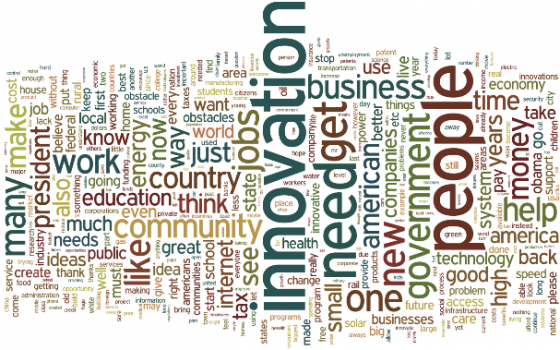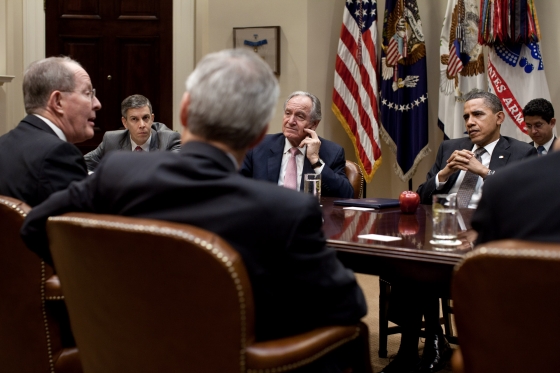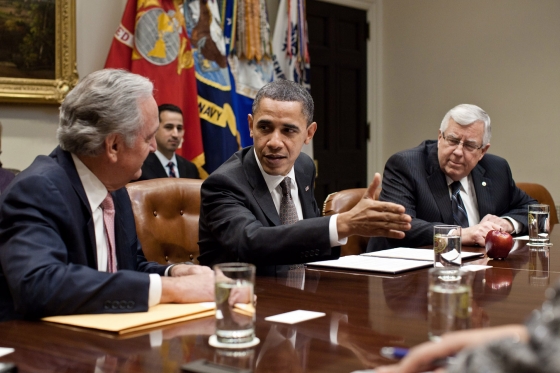-
The American Recovery and Reinvestment Act turns two years old today, thus prompting the Tin Man’s question: what have we learned from the implementation of the economic stimulus?
Some interesting and provocative answers to that question can be found in a new report out today, entitled A New Way of Doing Business: How the Recovery Act is Leaning the Way to 21st Century Government.
Now, I understand that implementation of government programs is not a topic that immediately grips the attention of a normal person. But even if you’re not a propeller-beanied policy wonk, this report is worth a look.
Why? Because it presents a chapter in the story of rebuilding faith in the ability of the Federal government to get things done effectively and efficiently.
-
"This year’s Medal of Freedom recipients reveal the best of who we are and who we aspire to be," President Obama said at the ceremony to award the Nation’s highest civilian honor. He described the occasion as "one of the things that I most look forward to every year. It’s a chance to meet with -- and, more importantly, honor -- some of the most extraordinary people in America -- and around the world."
Honorees sat down with our cameras to reflect on this momentous day and share their stories of inspiration, their best advice for young people and their ideas on how all Americans can give back. Now, you're invited to meet some of the extraordinary men and women that have inspired us, enriched our culture, and made our country and our world a better place.
Watch exclusive interviews with the 2010 Medal of Freedom recipients and the award ceremony.
-
As he said in his State of the Union, education is a key pillar of winning the future for America. That means more than just investing, it means focusing on reform, responsibility, and results, which is why the President met with a bipartisan group of legislators to discuss education reform efforts this morning. The White House readout of their meeting is below.
Today, President Obama had a productive meeting with Senators Tom Harkin, Mike Enzi, Jeff Bingaman, and Lamar Alexander. The President reiterated his strong belief that the nation’s economic future is being decided every day in classrooms across the country, and that reforming education through the reauthorization of the Elementary and Secondary Education Act is a key priority this year. During the bipartisan meeting, the President discussed his desire to find common ground on the need to re-define the federal role in education, so that it is more flexible and better focused on responsibility, reform, and results. He discussed raising expectations for students and schools, boosting teacher effectiveness, and providing greater flexibility to support innovation and improvements throughout public education – including fostering a Race to the Top in our schools and providing incentives and rewards to help students make significant strides and succeed. The President looks forward to continuing this vital, bipartisan work to ensure America’s students have the skills they need to out-educate and out-compete the world and win the future.
* Representatives John Kline, George Miller, Duncan Hunter, and Dale Kildee were called back to Congress for a vote, they departed before the meeting began.Learn more about the education initiatives in the President's 2012 Budget.
-
February 17, 2011
10:40 AM EDTEditor's note: This post is part of the Celebrating Black History Month series, which highlights the contributions of African Americans throughout the Administration whose work contributes to the President's vision for winning the future.
Black History Month has special meaning to me. As a son of the segregated South, I was twenty-four before I was able to walk through the front door of the café where my mother worked as a short-order
 cook and I was bused nearly 30 miles away each day for high school under the doctrine of ”separate but equal.” Growing up, I could never imagine the opportunities I had in my lifetime that came from the sacrifices and struggles of those who came before me.
cook and I was bused nearly 30 miles away each day for high school under the doctrine of ”separate but equal.” Growing up, I could never imagine the opportunities I had in my lifetime that came from the sacrifices and struggles of those who came before me.I worked for the National Park Service for 39 years, the last four of which I had the great honor of serving as the Director. I was the first Director to undergo confirmation hearings before the United States Senate and the first African American to serve in this position.
At the National Parks Service, we preserve and protect over 390 national parks, three-fourths of which tell the story of our Nation’s history and development. Some of the stories told or events commemorated in the national parks reflect injustices and wrongs done in our Nation’s history. Nevertheless, they are places that should give us hope that we can move beyond our difficulties “towards a more perfect union.” Moreover, the national parks also help us remember those who have advanced the freedoms and liberties that we enjoy today -- who have come down the pathways of struggle -- people like Frederick Douglass, Martin Luther King, Jr., and Mary McLeod Bethune.
It is a sure sign that we as a people are growing and maturing that we can recognize some of our mistakes with the hope that we can learn and grow from them. May we continue to seek to remember all of our past and honor all our peoples.
Bob Stanton is a Senior Advisor to the Secretary of the Interior Ken Salazar
-
In the second edition of the Advise the Advisor series, Austan Goolsbee, Chairman of the Council of Economic Advisers, is asking for your feedback on small businesses and entrepreneurship.
Next week, Austan will travel with President Obama to Cleveland, Ohio for the Winning the Future Forum on Small Business. At the Forum Austan and the President will have a chance to talk with small business owners and entrepreneurs about their ideas for how America can continue to grow the economy.
We want to be sure you’re a part of the conversation as well. So head over to WhiteHouse.gov/Advise to answer any (or all) of the questions below:
-
One of the great honors that the Vice President and I have had over the last two years has been being able to spend time with our service members and their families who shoulder so much of the burden for our country. I wanted to share some photos from two great visits we had recently.
Last week the Vice President was at Fort Campbell for an arrival ceremony to welcome home members of the 3rd Brigade Combat Team, 101st Airborne Division, returning from Afghanistan. He also made a point to meet with families of the returning soldiers to thank them for their sacrifice, and took some time for the Fort Campbell Falcons high school football who have family members serving in the military.
For my part, I was at Fort Stewart in Georgia earlier this week, where I heard from teachers, parents and school administrators about some issues they face in educating military children. While no doubt challenging, the elementary school was doing a great job and they have found some innovative ways to keep parents involved in their children's education during a deployment. One teacher told me she sets up parent-teacher conferences over the internet, so she can update them on their children's progress in the classroom.
-
On Monday, the Administration released the President’s Budget for Fiscal Year 2012. It’s a Budget that meets two goals: it makes tough but necessary cuts that put our nation on a sustainable fiscal path. And it’s a budget that invests wisely to ensure economic opportunity for working Americans.
As the President said Monday, this is a budget designed to help America win the future by out-innovating, out-educating, and out-building our global competition. But in order to afford those investments, the government needs to start living within our means. So we’re proposing over $1 trillion in deficit reduction, of which two thirds comes from spending cuts.
Yet we cannot abandon the needs of working families at this point in our economic recovery. Yes, our cuts have involved tough choices, and they will require sacrifices from many Americans. But there’s also a lot in this budget to help middle-class families get back to work, afford college, to protect them at work, and strengthen their retirement.
A few examples:
-
February 16, 2011
01:47 PM EDTEditor's note: This post is part of the Celebrating Black History Month series, which highlights the work of African Americans who are contributing to the President's goals for winning the future.
The value of education was instilled in me at a young age. I knew how fortunate I was to have parents who were first-generation college graduates from Virginia State College, a historically black college. My mother was a teacher and my father worked in finance and accounting. I felt it was imperative to make the most of the circumstances in which I was born.

When I was in first grade, we moved from Philadelphia, Pennsylvania to Peoria, Illinois. My sisters and I integrated our elementary school and I learned not to overreact to stereotypes and the biases of a few. I learned instead to serve as a bridge between different cultures and communities.
I received an academic scholarship to study engineering at Purdue University, which reinforced my belief that academics, not just prowess in athletics or entertainment, can be a path to success. After college, I attended Stanford Business School and received my MBA, finishing my studies in Japan. My career started in the private sector, working both in the US and abroad. These experiences gave me firsthand knowledge of the importance of education and what it takes to work in a globally connected world. This knowledge drives and motivates me every day. At the US Department of Education, we are working to ensure that all students have access to a high-quality education that will prepare them for the 21st century.
As Deputy Secretary and Chief Operating Officer at the US Department of Education, I have the privilege and honor of working with a very talented team of public servants. Every day we work to achieve President Obama’s 2020 goal of having the highest proportion of college graduates in the world. This is a formidable challenge -- 25% of our students drop out of high school and the US lags behind many other countries in preparing our youth with the reading, math, science, and critical thinking skills that are needed to succeed in today’s economy.
Under Secretary Duncan’s leadership, the Department is supporting states’ efforts to raise standards, improve instruction, develop the next generation of assessments, support the development of effective teachers and principals, and turn around low-performing schools. The Department is also investing in innovative practices that are demonstrated to have an impact on improving student achievement, closing achievement gaps, increasing high school graduation rates, and increasing college enrollment and completion rates. Our approach is both strategic and wide-ranging. We are establishing comprehensive and coordinated education policies, improving the data used to make decisions, improving the operating discipline of our key processes, enhancing the skills of our workforce, increasing transparency in the Department’s operations, and coordinating our work with other government agencies to be more efficient and effective.
Education is the civil rights issue of our generation. As President Obama said in his State of the Union address, the US can either innovate to stay competitive, or be left behind in this global economy. Our children need strong and effective educators working together with parents who are engaged in and enthusiastic about their child’s education. We are at a critical time when we can hold back or push forward into a better educated and competitive citizenry. I am here to work toward the latter.
Tony Miller is the Deputy Secretary of Education
-

Last week, I kicked off the new Advise the Advisor series on WhiteHouse.gov and asked for your ideas, comments and questions about how American innovation is affecting your communities and what we can do to remove obstacles to innovation.
Since then, thousands of you submitted comments and ideas over the course of the week. A team of people here at the White House reviewed every single submission.
We’ll post a more comprehensive analysis of your feedback in the coming days, but in the meantime, I want to highlight and respond to a couple of the common themes that we found in reading your feedback.
-
UPDATE: The deadline for the Race to the Top Commencement Challenge has been extended to March 11, 2011. This post has been updated to reflect that change.
The Race to the Top Commencement Challenge is back and we’re asking public high school students from across the country to tell us about ways their school is preparing them for college and a career. In return, we'll make sure one high school has a graduation they'll never forget – including a commencement address by President Obama himself.
President Obama and our Administration believe education is key to winning the future. In order to ensure our long-term economic success, we need to focus on out-educating and out-competing the world. That means helping to prepare students today for the jobs of tomorrow. It means equipping students with the skills they’ll need to succeed in the 21st Century economy – encouraging them to be creative, to solve problems, to work together to design solutions to important problems.
The Race to the Top Commencement Challenge is just one of the many ways we’re encouraging young people to actively engage in their educational success. Last year, over 1000 schools applied. This year, we hope to continue encouraging applications from students from across the country. We’re accepting applications until Friday, March 11 at WhiteHouse.gov/Commencement.
Apply today and don't miss this opportunity to have an unforgettable high school commencement.
-
Yesterday, President Obama traveled to Parkville Middle School and Center for Technology to unveil his budget proposal for 2012 and explain some of the tough choices we have to make so we can afford to invest in our future. During a news conference today, the President spoke about how the federal government, like American families, must consider all areas of the budget in order to live within its means while still investing in the future:
-
Earlier today, President Obama sent the email below to the White House email list about his FY2012 budget proposaland some of the tough choices we must make so that we can afford to invest in our future.
If you didn't get the email, be sure to sign up for the White House email list.
Just a few weeks ago, in my State of the Union Address, I spoke about how America can win the future by out-educating, out-innovating and out-building the rest of the world. I also talked about taking responsibility for our Nation's deficits, because we can’t win the future if we pass on a mountain of debt to our children and grandchildren.
Yesterday, I sent my budget proposal for 2012 to Congress, and I wanted to take a moment to explain some of the tough choices we had to make so we can afford to invest in our future.
Like American families, the Federal Government must live within its means. That means eliminating wasteful spending and cutting programs that aren't working. It also means that programs, like Community Development Block Grants, which I care about deeply, need to be scaled back to confront the crushing debt we face.
You can learn more about the budget proposal and watch Jack Lew, the Director of the Office of Management and Budget, explain our approach here:
-
Today, President Obama will honor fifteen recipients of the Presidential Medal of Freedom at a ceremony at the White House. As the President said, “These outstanding honorees come from a broad range of backgrounds and they’ve excelled in a broad range of fields, but all of them have lived extraordinary lives that have inspired us, enriched our culture, and made our country and our world a better place. I look forward to awarding them this honor.”
The Nation’s highest civilian honor, the 2010 Medal of Freedom is presented to individuals who have made especially meritorious contributions to the security or national interests of the United States, to world peace, or to cultural or other significant public or private endeavors.
Watch the 2010 Medal of Freedom Ceremony live at 1:30 p.m. EST on WhiteHouse.gov/live.
The following individuals will receive the Presidential Medal of Freedom at today's ceremony (read their full bios here):
-
President George H. W. Bush
George Herbert Walker Bush was the 41st President of the United States. -
Chancellor Angela Merkel
Angela Merkel is the Chancellor of the Federal Republic of Germany. -
Congressman John Lewis
John Lewis is an American hero and a giant of the Civil Rights Movement. -
John H. Adams
John H. Adams co-founded the Natural Resources Defense Council in 1970. -
Maya Angelou
Dr. Maya Angelou is a prominent and celebrated author, poet, educator, producer, actress, filmmaker, and civil rights activist, who is currently the Reynolds Professor of American Studies at Wake Forest University. -
Warren Buffett
Warren Buffett is an American investor, industrialist, and philanthropist. He is one of the most successful investors in the world. -
Jasper Johns
American artist Jasper Johns has produced a distinguished body of work dealing with themes of perception and identity since the mid-1950s. -
Gerda Weissmann Klein
Gerda Weissmann Klein is a Jewish Holocaust survivor who has written several books about her experiences. -
Dr. Tom Little (Posthumous)
Dr. Tom Little was an optometrist who was brutally murdered on August 6, 2010, by the Taliban in the Kuran Wa Munjan district of Badakhshan, Afghanistan, along with nine other members of a team returning from a humanitarian mission to provide vision care in the remote Parun valley of Nuristan. -
Yo-Yo Ma
Yo-Yo Ma is considered the world’s greatest living cellist, recognized as a prodigy since the age of five whose celebrity transcends the world of classical music. -
Sylvia Mendez
Sylvia Mendez is a civil rights activist of Mexican and Puerto Rican descent. -
Stan Musial
Stan “The Man” Musial is a baseball legend and Hall of Fame first baseman for the St. Louis Cardinals. Musial played 22 seasons for the Cardinals from 1941 to 1963. -
Bill Russell
Bill Russell is the former Boston Celtics’ Captain who almost single-handedly redefined the game of basketball. -
Jean Kennedy Smith
In 1974, Jean Kennedy Smith founded VSA, a non-profit organization affiliated with the John F. Kennedy Center that promotes the artistic talents of children, youth and adults with disabilities. -
John J. Sweeney
John J. Sweeney is the current President Emeritus of the AFL-CIO, and served as President of the AFL-CIO from 1995 to 2009.
-
President George H. W. Bush
-
Good morning folks. In our meetings, conference calls, and feedback we received from young people over the last several weeks, we’ve heard that many of you have questions about the health care law, the Affordable Care Act.
So I’ll be sitting down with our new media and policy teams Wednesday to answer YOUR questions via the White House twitter account.
Join me on Wednesday, February 16th, at 11:30 am ET.
You can send in your questions to @whitehouse with the hashtag #hcr. Look out for responses beginning at 11:30 am Wednesday.
Kalpen Modi is Associate Director of the White House Office of Public Engagement.
-
Last week was the first anniversary of Let's Move!, a comprehensive initiative launched by First Lady Michelle Obama that is dedicated to solving the problem of childhood obesity within a generation.
You may have seen our post last week that included a video of schoolchildren singing in honor of the First Lady’s visit and a review of her remarks at North Point Community Church in Alpharetta, Georgia.
We did a quick wrap-up video of all her travels around the anniversary. Check it out:
Robin Schepper is Executive Director of the Let's Move! initiative.
-
Every February, couples and families take a special day to share their commitment and affection on Valentine's Day. This year, I had the opportunity to spend my Valentine's Day with soldiers and military families to share my appreciation for all they do and to reaffirm the Administration’s commitment to support our service members and their families.
I traveled to Fort Stewart, Georgia, with Army Chief of Staff General George Casey and his wife Sheila. Fort Stewart is home to the Army's 3rd Infantry Division, and more than 5,000 soldiers from the base are deployed overseas. Visiting with the families was a great privilege, and the pride that each of them had in the service of their loved ones was plain to see.
For families, being apart on a day like today can be especially tough. Some of our service members in the Navy put together a special video of Valentine's messages from home to sailors, aviators, and Marines abroad.
I wanted to share it with you:
I hope that every American keeps in their thoughts and prayers the brave men and women of our armed forces and the families who eagerly await their safe return. Those families bear a heavy burden and bear it gladly, but it's our role as friends and neighbors to make sure they don't bear it alone.
As a military mom, I know how a simple act of kindness can make a difference.
Please take a minute to visit Serve.gov to find ways you can help support our military families.
--Jill
-
Today, the President sent to Congress his budget for the 2012 fiscal year. This document is built around the simple idea that we have to live within our means so we can invest in the future. Only by making tough choices to both cut spending and deficits and invest in what we need to win the future can we out-educate, out-build, and out-innovate the rest of the world.
This is the seventh Budget that I have worked on at OMB, and it may be the most difficult. It includes more than $1 trillion in deficit reduction – two-thirds from spending cuts -- and puts the nation on a path toward fiscal sustainability so that by the middle of the decade, the government will no longer be adding to our national debt as a share of the economy and will be paying for what it spends – and will be able to sustain that for many years afterwards.
The President has called this budget a down payment because we will still have work to do to pay down the debt and address our long-term challenges. But it is a necessary and critical step for we cannot start to move toward balance and to cutting into the size of our debt until we first stop adding to it – and that is what this Budget does.
-
Ed. Note: Learn more about the President's Budget from the OMB site or watch OMB Director Jack Lew's White House White Board.
The budget going through Congress can often come off as boring process, one too mired in details and political back-and-forth to be worth following. But the President traveled to Parkville Middle School and Center for Technology in Baltimore to unveil his budget plan this morning in a reflection of the fact that in the tough choices we face as a nation, our kids' futures are at stake. That's why the President's Budget would get our deficits under control, but it's also why he stands by investments in education, and it has a lot to do with why he supports investments in building a 21st Century infrastructure and fostering American innovation -- in short, a budget to win the future:
-
Ed. Note: Learn more about the President's Budget from the OMB site or watch the President discuss the Budget during a visit to Parkville Middle School and Center for Technology in Baltimore.
In this White House White Board, Jack Lew, Director of the Office of Management and Budget, explains how the President's Budget will help the government live within its means, while still investing in America's future. Look for much more detail here at WhiteHouse.gov Monday afternoon.
Viewing this video requires Adobe Flash Player 8 or higher. Download the free player. -
The White House has released a statement from National Security Advisor Tom Donilon on Iran:
By announcing that they will not allow opposition protests, the Iranian government has declared illegal for Iranians what it claimed was noble for Egyptians. We call on the government of Iran to allow the Iranian people the universal right to peacefully assemble, demonstrate and communicate that’s being exercised in Cairo.
- &lsaquo previous
- 1
- 2
- 3
- 4
- 5
- 6
- 7
- 8
- 9
- …
- next &rsaquo





















